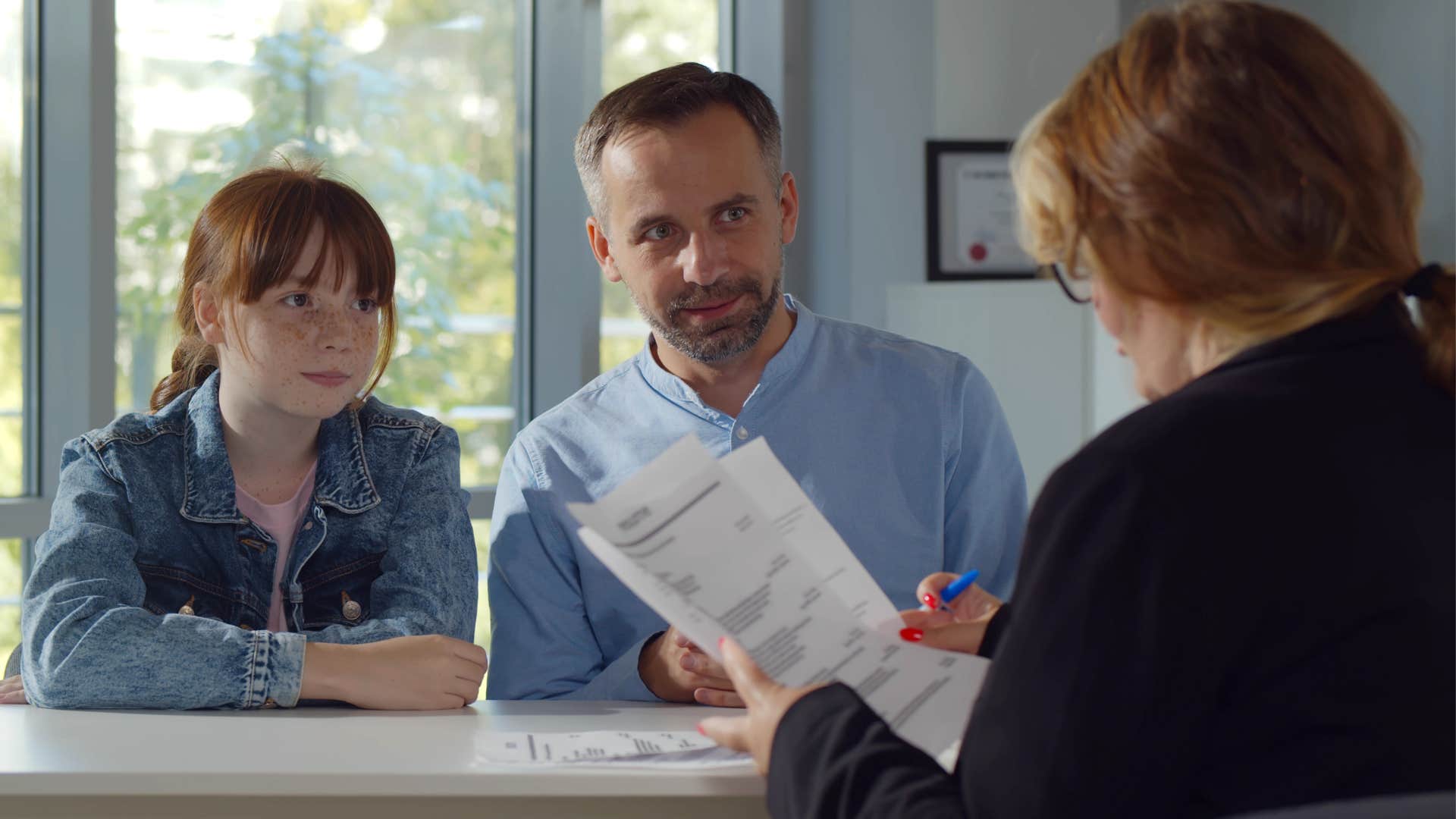Teachers Secretly Dislike Parents Who Constantly Bring Up These 11 Things
Certain parent request and comments irk teachers more than you'd think.
 PeopleImages | Shutterstock
PeopleImages | Shutterstock Parents usually have their own views for how they wish to raise their children. Some choose to rarely ever discipline their kids and always believe their child is right. And while everyone has their own right to parent how they see fit, different parenting styles can become an issue for teachers.
Parents will often confront teachers about everything under the sun, whether it's asking for extra credit, thinking their child deserves an automatic A, or interfering with the curriculum. But teachers secretly dislike parents who constantly bring up these things, as they hinder the parent-teacher dynamic that aids in the success of the students and make it difficult for a teacher to remain an authority figure in the classroom.
Teachers secretly dislike parents who constantly bring up these 11 things
1. Their child being bored because the work is too easy
 Drazen Zigic | Shutterstock
Drazen Zigic | Shutterstock
While it may not be intended as a jab at a teacher's professional expertise, when a parent claims their child is just too smart for the work being assigned, it definitely comes across to the teacher as a hit to their abilities to teach. If the teacher has a different reasoning behind why the child struggles with being engaged in the material, a statement like this aims to discredit them.
A teacher pays significant attention to the progress and engagement each child shows with the schoolwork they provide. Instead of believing the child is too prestigious for the work, the teacher may bring up that the child struggles with a lack of motivation or can't seem to master the skill, all of which are things a parent who says something like this would not want to hear.
2. Their child not getting straight As because of the teacher
 Ushuaia studio | Shutterstock
Ushuaia studio | Shutterstock
Teachers secretly dislike parents who constantly bring up their child's low grades and blame it on the teacher themselves. According to English teacher Jane Morris, some parents want to blame the responsibility of the child on the teacher, even though, "Back in the good ol' days of teaching (pretty much any time before the year 2000), parents and teachers were a team, united for kids' success and against their nonsensical behavior."
When parents do this, it shows an extreme misunderstanding of what the teacher's overall role is, and it is an accusation that they may not be treating the child fairly. A teacher is there to help facilitate the learning process and help the student where they can. It is the child's responsibility to engage in coursework and ask for help when they are struggling so they can make the grades they want.
If a teacher feels like they are being accused of being unfair even though they are handling their role and grading the child based on what they earn, they are not going to appreciate the accusation from the parent.
3. Not wanting their kid to do homework
 DimaBerlin | Shutterstock
DimaBerlin | Shutterstock
When a parent says their child will not be doing any homework at home and they expect that the teacher will go over all material at school rather than sending work home, the teacher will not appreciate or enjoy this statement. A statement like this undermines classroom instruction and insists that the educational process is poor.
A parent not advocating for the additional skills that the role of homework influences is also a reason a teacher would dislike this comment. Homework is meant to influence independent learning and encourage practice of material, even outside of the classroom. The disadvantages the student will have to endure by not prioritizing homework will upset the teacher, especially if they have the child's best interest at heart.
4. Asking for extra credit so their child can get a higher grade
 Africa Studio | Shutterstock
Africa Studio | Shutterstock
While it may not seem like the worst thing for a parent to request extra credit for their child, a teacher may negatively view a request like this for a few reasons. This request could be seen as an unfair advantage, it could feel like it is undermining the grading system, and could potentially keep the child from learning to minimize their poor learning habits.
If a teacher allows extra credit for one child, they have to allow it for every child, otherwise it could be viewed as unfair. As French teacher Jocelyn Smith explained, "All students should have the same access to all activities. [Extra credit] prevents equal opportunity to all students [as it can be different] for every class."
If the teacher already has a strict grading system set in place, requesting them to not abide by those policies could be viewed in a negative light. Teachers want to see a child succeed in their learning, so by providing them extra credit rather than helping them learn from their previous mistakes, it would not be as conducive to them achieving that success.
5. Believing their child's teacher doesn't teach
 Olimpik | Shutterstock
Olimpik | Shutterstock
A parent may view repeating to a teacher that their child says the teacher doesn't teach, all as a way to stand up for their child. However, teachers secretly dislike parents who constantly bring up these things because it feels like a personal and professional attack that could even make them worry about their job security.
If a teacher has put many hours and a lot of effort into the curriculum and teaching it, claiming that they don't teach makes them feel like, despite all of their efforts, they haven't accomplished what they intended.
A parent claiming something like this also takes away from the professional authority of the teacher, which can make the child more difficult to manage and teach. Both of these potentially lower the teacher's professional self-esteem and make them question their job security, instructional coach Angela Watson revealed.
6. Requesting all assignments in advance
 PeopleImages | Shutterstock
PeopleImages | Shutterstock
When parents ask for all the assignments for the year in advance, this not only disrupts the teaching process, it also makes the teacher feel as though the parent doesn't trust their professional judgment.
A syllabus at the beginning of the school year will usually be a living document, meaning it is subject to any changes the teacher sees fit based on the needs of the students and the time they have to cover material. When a parent wants all of the material upfront, it makes it difficult on the teacher because they aren't even sure all the material will get covered.
The teacher may also feel this is a jab to their professional abilities, and that the parent does not believe the teacher can give quality instruction to their students.
7. Insisting their child is always right
 Gala AP | Shutterstock
Gala AP | Shutterstock
A parent who insists that their child is always right most likely doesn't address and discipline their child's poor behavior. This is an issue for teachers because not only does it make the child more difficult to manage at school, it also diminishes the authority of the teacher.
If while the child is at school, they feel like they can do whatever they want without having to suffer the consequences, it makes it hard for the teacher to reason with the child and explain to them why what they did was wrong. The child will also believe that, although they are an authority figure, the teacher can be challenged and the instructions they give do not need to be followed.
8. Comparing the amount of work to what other teachers assign
 nimito | Shutterstock
nimito | Shutterstock
Each teacher assigns a different amount of work based on the rigorous nature of the class as well as what the overall needs of the classroom are. This being the case makes it especially annoying for teachers when a parent compares the amount of work they assign to the amount of work other teachers assign.
This discredits the teacher's expertise and professional judgment of what amount of work should be assigned based on the class. It also feels more accusatory rather than respectful enough to open up the discussion to finding a collaborative solution.
9. Prioritizing extracurriculars over schoolwork
 PeopleImages | Shutterstock
PeopleImages | Shutterstock
While extracurricular activities hold a significant amount of weight, most teachers believe a student's grades and schoolwork should be their top priority. Since most teachers feel this way, they don't tend to be the most fond of parents who urge their children to care more about their extracurriculars than their schoolwork.
Instead of parents helping their children find a way to balance schoolwork and extracurriculars by planning ahead, abiding by a realistic schedule and avoiding procrastination, as experts from Educate Excellence suggest, it is almost as if they work against the teacher by telling their children to focus primarily on extracurriculars. This makes it hard for the parent and teacher to team up and work towards bettering the child's education.
10. Excusing their child's low performance
 Alexander_Safonov | Shutterstock
Alexander_Safonov | Shutterstock
When a parent chooses to excuse their child's low performance rather than meet with the teacher to see why this might be and work on the child's performance, the child's academics will suffer. Teachers secretly dislike parents who constantly bring this up because they want to see their students succeed in their academics.
Teachers prefer when they, along with the parents, are both equally invested in problem-solving and figuring out ways to help the child learn. According to English teacher and author Stephanie Jankowski, this parent-teacher partnership doesn't stand a chance if the parent never helps their child acknowledge where they are falling short and helps to ensure they get the hang of whatever material they are struggling with.
11. Expecting the school to handle discipline
 ArtPhoto21 | Shutterstock
ArtPhoto21 | Shutterstock
Similar to what happens when a parent excuses their child's low performance, it makes it complicated for teachers and parents to work together as a team for the betterment of the child. This is something teachers dislike because it causes the parent to have unrealistic expectations of the school and the teacher, and usually means the parent isn't disciplining the child at home.
The educational development of the child comes from both parent and teacher. When these unrealistic expectations are set and the partnership between parent and teacher is hindered, the child's success is at risk, which upsets teachers.
When interacting with teachers, parents should consider not only how it may make the teacher feel, but also the overall impact their request or assumptions have on their own child and the rest of the children in the classroom.
Kamryn Idol is a writer with a bachelor's degree in media and journalism who covers lifestyle, relationship, family, and wellness topics.

